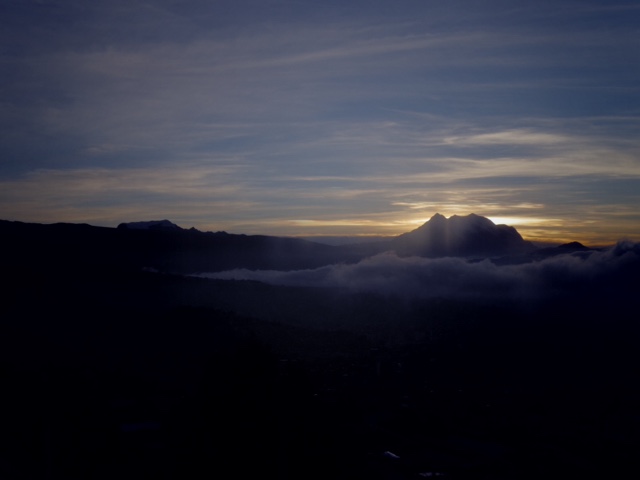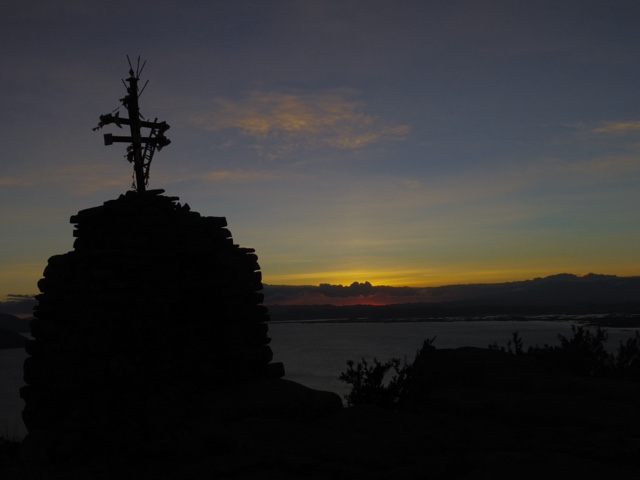Sunrise over La Paz
Lucy and I recently took a short trip to Peru, partly for Lucy to change from a student visa to a tourist visa, and partly to meet up with our friend Alix Wicker. Alix has been living in Chile, but happened to be traveling in Peru. She'll be joining us on the bike trip later this spring, so we also had some camping gear to hand off to her.
We agreed to meet in Puno, on Lake Titicaca. Our journey began with an overnight bus to La Paz. We showed up at the thoroughly-crazy Cochabamba bus terminal an hour or so before we wanted to leave. Tickets are cheapest right before departure, so we walked around asking about prices at the various desks advertising late buses to La Paz. Meanwhile, the terminal was dense with passengers and touts yelling city names -- Orururururururu Orururururururu!
We purchased tickets, headed to the gate and handed across our luggage. We were gestured to wait at the door next to the gate, which was still locked. Around the time our bus was meant to depart, we decided to ask again, and were told to go a couple gates further along, to an open door. Whoops. As we ran outside to a wall of parked buses, a random passenger looked at our ticket and told us where to find our bus. As we ran up to it, we found it reversing out, with doors shut. We gesticulated and waved our tickets, but the driver wouldn't open up. Eventually the luggage guy grabbed us and we followed him at a run to the terminal exit. We waited there as our bus pulled round, then jumped aboard when the bus paused to let us on. I (Adie) was filled with adrenaline, but Lucy was calm. I guess acclimatizing means more than just getting used to the altitude!
We got into La Paz as the sun rose behind Illimani (6500ish meters), as seen in the top photo. After breakfast we got on a bus to Puno. The route, via Copacabana, took us to a straight where the bus crossed Lake Titicaca (on a wooden barge...we passengers disembarked and took little launches across). However, at the far side there were two immigration officials checking passports. I got through fine, but they pulled Lucy aside. Lucy had a preliminary 30-day student visa, but the Cochabamba immigration office never gave the final approval to SIT, so Lucy technically had no visa after her first month here. The students were simply told to pay a fine when exiting the country. The officials took Lucy to the office, while I waited for the bus. I got on last and explained the situation to the driver. He was not happy, saying we were already behind schedule, but I then chatted to the luggage guy and he was more understanding. Still no Lucy, and the driver was getting frustrated, engine running, horn honking, edging forward. Finally Lucy appears and we are off.
Lucy paid a fine, but the officers had given her 90 legal days, the allotment for tourists, instead of 30. However, they then said that because she had had her 90 days, she wouldn't be allowed back in the country until January (when everything resets). Yikes! When we reached Copacabana, Lucy called the administrator of SIT for advice. She said to simply go to the border, not mention that she had already paid a fine, and make sure the officials there only gave her 30 legal days. This she did, which worked, and the official said Lucy could re-enter just fine. Yay!
We got to Puno mid-afternoon and spent several hours walking around getting cash and finding a reasonably priced place to stay. Meanwhile, we hadn't heard from Alix, but knew there was a roadblock on her bus route to protest rising water prices, so we got some dinner and hung tight. Eventually Alix turned up and we had a fun reunion in the hotel room eating exotic fruit and dark chocolate! We read up on Puno and decided that actually, it didn't have much going for it.
The next morning we walked up the hill behind the city, and then traversed through farmland before descending back into town. Then we packed up and got on a collectivo (shared minivan taxi) towards Llachon, a town on a peninsula about 50km from Puno. The peninsula is visible in the center of the photo above. We had vague plans to sleep on a beach there, if nothing better turned up. Puno has some very touristy areas, but as soon as we stepped off the tourist trail we were the only gringos around. On the collectivo we got to chatting with a man about our age, who was heading back to Llachon to visit his family. Turns out they rent rooms through a budding community tourism association. So we got off with him and followed him back to his house, and what a stroke of luck it was! His siblings live in a set of houses right above the lake, where they farm and fish.
That evening, we hiked up the hill behind the house for the sunset, then returned for dinner. Both of us were definitely feeling the altitude, while Alix was able to scamper ahead after having a week to acclimatize while hiking to Machu Picchu!
Over the next two days we got to know our hosts a bit better, particularly the two young girls and the family's new kitten! They were all very kind and generous, sharing about their lives, the fledging tourist business, and the drought they are currently suffering from. All while providing simple, delicious meals, fresh mint tea, and endless entertainment! The two little sisters were quite a smart, playful pair!
Our second day we hiked over to the other side of the peninsula, where we found a beach and went for a chilly swim!
We headed back to Puno and parted ways with Alix after lunch. We got on a bus to La Paz, but again Bolivian immigration was a pain. Lucy with her American passport had to provide all sorts of extra info (including a slightly-modified letter of welcome from her host family to prove she had somewhere to go in Bolivia). Then, the immigration officer said she couldn't get back into the country until January. Lucy protested and spotted the officer who she had dealt with three days earlier, who confirmed it was ok to let her back in. Phew! Post-immigration happy-Lucy can be seen below.
We changed buses in Copacabana, but were running a bit late. When we realized we also had lost an hour due to time difference, we knew that we would be cutting it close in La Paz. We weren't sure when the last bus to Cocha would be, but 10:30 was a good bet. As we inched through traffic in El Alto, above La Paz, 10:30 was rapidly approaching. We got to the bus terminal at 10:45, and thankfully, just inside the door was a tout shouting "Cochabamba, Cochabamba!" We yelled, "si!" and followed her to the bus. We didn't have enough small bills to make up the fare, and she didn't have change, so we got our tickets even cheaper.
Looking back at Peru, we are surprised at how open and curious people were. We had conversations with lots of different people, which we weren't expecting because of how touristy the places we visited were. We're looking forward to spending some months in Peru later this spring!














0 comments:
Post a Comment